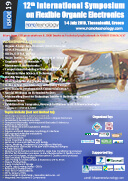Organic Photovoltaics (OPVs) is an emerging technology that will revolutionize the generation of electricity by renewable sources. The OPVs have many advantages, such as low cost, ease in process and conformability to curved surfaces, that make them attractive for numerous mass-market application areas. The enormous effort in the science and technology of OPVs led to many achievements in terms of device efficiencies. Several research groups & companies have announced very high device efficiencies. However, in order for OPVs to be implemented for mass production, there are still open issues to be overcome, as the lower efficiency values and shorter lifetimes in comparison to other PV technologies (e.g. inorganic PVs).
Also, Perovskite PVs are an emerging field and rapidly expanding field which will revolutionize PV technology and applications since it combines simple and low-cost manufacturing methods with high device efficiencies (above 15%). These PVs have enormous commercial potential for implementation to consumer applications for the market in the near future.
The Workshop on OPVs and Perovskites PVs will reveal, discuss and contribute to solving of all aspects covering the synthesis, thin film fabrication of new organic semiconductor (conjugated polymers, evaporated small molecules or solution processed small molecules) and electrode materials, efficient charge transfer mechanisms, optimization & control of blend morphology, device architectures, lifetime and stability, and mass manufacturing.
The OPVs and Perovskite PVs Workshop topics include:
- Polymer & Small Molecule Organic Semiconductors
- Organic/inorganic and hybrid materials and systems
- Perovskite PVs
- Perovskite Materials & Novel Device Concepts
- Perovskite Fabrication techniques (Vacuum, Printing)
- Synthesis of novel nanomaterials for OPVs
- Novel device architectures (e.g. single, tandem)
- Morphology & Interfaces characterization and control
- Influence of nano-morphology on device physics
- Device Stability & Lifetime
- Plasmonic OPVs
- Charge transport and microstructure relationships
- Device Modelling, Simulations & Computational Methods
- High efficiency approaches in vacuum and printing technologies
- Novel fabrication by lab- and large area processes (e.g. Printing, Vacuum, Patterning)
- Thin film monitoring and optimization of processes
- Large Scale Manufacturing & Applications
Workshop International Organizing Committee:
- Prof. Gerrit Boschloo, Department of Chemistry, Uppsala Univeristy, Sweden
- Dr. Konstantinos Fostiropoulos, Helmholtz-Zentrum Berlin, Germany
- Dr. Markus Schraber, Linz Institute for Organic Solar Cells, Johannes Kepler University Linz, Austria
- Prof. Vladimir Dyakonov, University of Würzburg, Germany
- Dr. Bertrand Fillon, IPC, France
- Dr. Jörg Ackermann, Centre Interdisciplinaire de Nanoscience de Marseille (CINaM), France
Supported by the EU Projects:





























